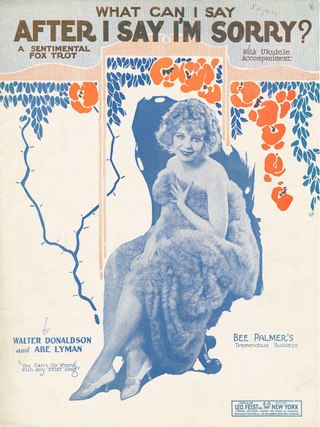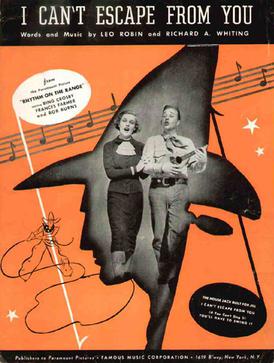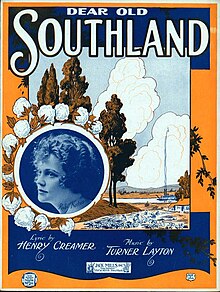"Thinking of You" is a popular song, composed by Harry Ruby with lyrics by Bert Kalmar. It was introduced in the Broadway show, The Five O'Clock Girl (1927) when it was sung by Mary Eaton and Oscar Shaw.
"A Hundred Years from Today" is a popular song published in 1933 with music by Victor Young and lyrics by Ned Washington and Joe Young. The song was included in the London production of Lew Leslie's Blackbirds of 1934.
"Prisoner of Love" is a 1931 popular song, with music by Russ Columbo and Clarence Gaskill and lyrics by Leo Robin.
Shine is a popular song with lyrics by Cecil Mack and Tin Pan Alley songwriter Lew Brown and music by Ford Dabney. It was published in 1910 by the Gotham-Attucks Music Publishing Company and used by Aida Overton Walker in His Honor the Barber, an African-American road show. According to Perry Bradford, himself a songster and publisher, the song was written about an actual man named Shine who was with George Walker when they were badly beaten during the New York City race riot of 1900.

"I'll Get By (As Long as I Have You)" is a popular song with music by Fred E. Ahlert and lyrics by Roy Turk that was published in 1928. Versions by Nick Lucas, Aileen Stanley and, most successfully, Ruth Etting, all charted in America in 1929.
"I Had the Craziest Dream" is a popular song which was published in 1942. The music was written by Harry Warren, the lyrics by Mack Gordon.

"Somebody Loves Me" is a popular song, with music written by George Gershwin, and lyrics by Ballard MacDonald and Buddy DeSylva. The song was published in 1924 and featured in George White's Scandals of 1924.

"Deep River" is an anonymous African-American spiritual, popularized by Henry Burleigh in his 1916 collection Jubilee Songs of the USA.

"Everybody Loves My Baby", also known as "Everybody Loves My Baby, but My Baby Don't Love Nobody but Me", is a popular and jazz standard song composed by Spencer Williams in 1924. Lyrics were written by Jack Palmer.
"The Lamp Is Low" is a popular song from the 1930s. The music was written by composers Peter DeRose and Bert Shefter, adapted from Pavane pour une infante défunte, a composition by Maurice Ravel. The lyrics were written by Mitchell Parish.

"What Can I Say After I Say I'm Sorry?" is a popular song by Walter Donaldson and Abe Lyman, published in 1926.
"Please Be Kind" is a 1938 American song composed by Saul Chaplin with lyrics by Sammy Cahn. Popular recordings that year were by Mildred Bailey and the Red Norvo Orchestra; Bob Crosby & His Orchestra ; and by Benny Goodman & His Orchestra.
"Flamingo" (1940) is a popular song and jazz standard written by Ted Grouya with lyrics by Edmund Anderson and first recorded by singer Herb Jeffries and the Duke Ellington Orchestra on December 28, 1940, for Victor Records. This briefly reached the Billboard charts in 1941.

"Runnin' Wild" is a popular song first composed and recorded in 1922, written by Arthur Harrington Gibbs with lyrics by Joe Grey and Leo Wood.
Liza (All the Clouds'll Roll Away)" is a song composed by George Gershwin with lyrics by Ira Gershwin and Gus Kahn. It was introduced in 1929 by Ruby Keeler (as Dixie Dugan) in Florenz Ziegfeld's musical Show Girl. The stage performances were accompanied by the Duke Ellington Orchestra. On the show's opening night in Boston on June 25, 1929, Keeler's husband and popular singer Al Jolson suddenly stood up from his seat in the third row and sang a chorus of the song, much to the surprise of the audience and Gershwin himself. Jolson recorded the song a few days later on July 6, 1929, and his rendition rose to number nine on the charts of the day.
Blue and Sentimental is a song written by Count Basie, Jerry Livingston, and Mack David. It was written in 1938 and recorded by the Count Basie Orchestra on 6 June that year.
"For You" is a song written by Joe Burke and Al Dubin in 1930. It was introduced in the Mack Sennett short Billboard Girl (1932) when it was sung by Bing Crosby. The best known version was from musician Rick Nelson in 1964, when it peaked at #6 on the Billboard Hot 100 and at #66 on the year end.
"There's a Rainbow 'Round My Shoulder" is a 1928 song sung by Al Jolson in the early Warner Bros. talking picture The Singing Fool the same year. The song, along with "Sonny Boy" and "I'm Sitting on Top of the World", which were also in The Singing Fool, were big hits for Jolson. The song was written by Al Jolson, Billy Rose and Dave Dreyer.
Moanin' Low is a popular torch song. The music was written by Ralph Rainger; the lyrics by Howard Dietz. The song was published in 1929 and was introduced that same year in the musical revue The Little Show by Libby Holman becoming a hit and Holman's signature song. A recording by The Charleston Chasers was also popular in 1929.

"I Can't Escape from You" is a song written music by Richard A. Whiting and lyrics by Leo Robin for the 1936 Paramount Film "Rhythm on the Range", and first introduced in the film when Bing Crosby sang it to Frances Farmer. Crosby recorded it for Decca Records that same year with the Jimmy Dorsey Orchestra and it was in the hit parade for 11 weeks reaching a peak position of No. 7. Crosby recorded the song again in 1954 for his album Bing: A Musical Autobiography.







